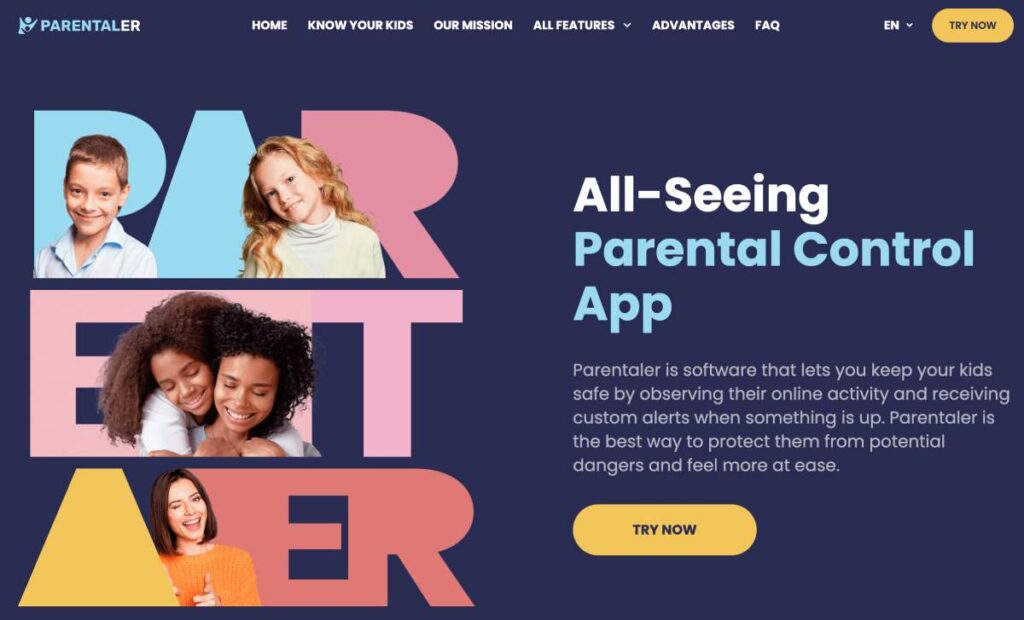

Do you still wonder why should parents check their child’s phone? Mobile apps have developed into a reliable point of interaction between kids and online environments as the number of people with access to affordable mobile devices has increased. The app industry offers various well-liked items that kids desire to interact with when using their smartphones, ranging from video to social networking and education.
In the past few years, parents and organizations have been highly conscious of the potential threats associated with social media use. The percentage of parents who said they examine the websites and apps their child uses rose from 78 percent to 84 percent between 2020 and 2021, indicating a stricter approach to technology and a better grasp of the issues related to young children’s internet usage. In this article, we will take a closer look at whether should parents check their child’s phone or if it is unnecessary.

Reasons Why Parents Should Monitor Their Children’s Internet Use
The internet can expose children to inappropriate content like violence, hate speech, pornography, and more. The American Psychology Association reports that the approximate age for children to access porn is 13. Social media bombards them with unrealistic beauty standards and peer pressure. In turn, the BBC reports that teens at the age of 12-13 claim to be porn-addicted.
YouTube recommender algorithms often lead kids to extreme, disturbing, or misleading videos. According to the Pew Research Center survey, 73% of respondents claimed that they believe their child can be exposed to inappropriate content on YouTube. Even if parents go through their child’s phone, they cannot detect every possible danger on their own.
Predators use the anonymity of the internet to contact, groom, and exploit children. Reports of online enticement of kids on social media have more than tripled in recent years. As Harvard research states, 1 out of 7 children has been threatened by predators online. Pedophiles court children through chat rooms, apps, and gaming sites.
Cyberbullying continues to increase as social media becomes ubiquitous. According to the StopBullying project, bullying has affected 20% of students nationwide between the ages of 12 and 18, which is linked to anxiety, depression, and suicidal thoughts. Cyberbullies harass victims via offensive posts, messages, and embarrassing images. It is not nonsense that some parents look through their child’s phone. However, do they know where to look for the dangers?
Social media promotes unrealistic portrayals of others’ lives, causing distress when children inevitably fail to measure up. Kids base self-worth on likes, shares, and online validation. Excessive social media use is associated with sleeping disorders, eating issues, and diminished self-esteem.
The internet facilitates cheating in schools through paper mills, quiz answers, and group chats. The National Center for Academic Integrity states that more than 60 percent of students confessed to cheating in some form. You know, for teenagers, parents checking child’s phone isn’t a thing they can’t cheat on.
Kids can fall into unhealthy internet overuse and video game addiction. Approximately 13 percent of players have a gaming addiction. Exposure to misinformation online negatively impacts children’s worldviews. The internet can normalize dangerous challenges, self-harm trends, substance abuse, and other risky behaviors.
Identity theft is a growing threat as children use the internet largely unaware of privacy risks. Nearly three-fourths (73%) of respondents indicated they had only experienced one case of identity theft in their life. Scammers, hackers, and data collection companies can access kids’ personal information for exploitation.
What Are Signs of Unhealthy Phone Use in Kids?
- Preoccupation with phone activities like gaming or social media. Extreme irritation when asked to put the phone down.
- Declining interest in hobbies, sports, and social activities. Withdrawing from family and friends. It is one of the most common reasons why parents should monitor their children’s internet use.
- Avoiding sleep to use phone late into the night. Overtiredness, sleep difficulties, and mood changes.
- Worsening academic performance and inability to focus during classes. Using a phone during schoolwork.
- Secretive behavior like hiding phone screens or usage. Defensiveness when asked about online activities.
- Using the phone to avoid uncomfortable emotions or mental health issues like depression or anxiety.
- Changes in mood or demeanor after using the phone, like increased hostility or sadness.
- Physical symptoms like headaches, eye strain, and neck pain from phone overuse.
- Violating family rules about phone use, like usage limits, prohibited apps, or texting at the dinner table.
- Risky online behaviors like sexting, cyberbullying, chatting with strangers, or viewing inappropriate content. Still looking for reasons why parents should monitor their children’s internet use?
- Withdrawal symptoms like agitation, restlessness, or acting out when the phone is unavailable. Difficulty enjoying life offline.
- Obsession with likes, shares, followers, and curating an online image. Judging self-worth by social media metrics.
If you observe a combination of these signs, have an open discussion about your child’s phone habits. Work together to institute boundaries and replace online time with healthy activities. Seek professional help for relationships damaged by excessive phone use.
It Will Become Better If Parents Go Through Their Child’s Phone
Should parents monitor their children’s internet and/or social media usage? Yes, yes, and yes!
In today’s digital age, where children are constantly exposed to the internet and its myriad of risks, it is more crucial than ever for parents to actively monitor their children’s online activities. But how can parents effectively safeguard their children in this vast digital realm? One solution lies in utilizing reliable and discreet parental control tools like the Parentaler app.
Parentaler is a powerful tool that can be your ally in ensuring your child’s safety and well-being in the digital world. With the app’s assistance, parents can proactively protect their children from online threats, fostering a healthier and safer online experience.
Should parents monitor their children’s internet usage? They not only should, they must!
Here are some key features of the Parentaler app that make it an invaluable asset in your parenting toolkit:
- Content Filtering: Parentaler allows you to filter and block inappropriate content, ensuring that your child does not stumble upon violent, explicit, or harmful material while browsing the internet.
- App Management: With this app, you can monitor and control the applications your child uses, preventing them from accessing potentially harmful or time-wasting apps.
- Location Tracking: Parentaler enables you to track your child’s location in real-time, providing peace of mind and ensuring their safety when they are outside.
- Social Media Monitoring: Parentaler allows parents go through their child’s phone to keep an eye on their child’s social media activities, helping them detect and address any cyberbullying or inappropriate interactions.
- Web Browsing History: By checking their web browsing history, you can identify any red flags and initiate conversations about safe online behavior.
- Time Management: Parentaler allows you to set screen time limits, ensuring that your child doesn’t spend excessive hours on their device.
- Alerts and Notifications: Receive instant alerts when your child encounters potentially harmful content or tries to bypass parental controls.
- Geofencing: Parentaler allows parents look through their child’s phone and offers geofencing capabilities, allowing you to define safe zones and receive alerts when your child enters or leaves these designated areas. This feature is particularly useful for ensuring your child’s safety and whereabouts.
- Call Monitoring: With Parentaler, you can monitor your child’s call history, including incoming and outgoing calls. This feature helps you stay informed about who your child is communicating with and can raise red flags if necessary.
- SMS and Messages: Parentaler provides the ability to monitor text messages and instant messaging apps. This way, you can keep an eye on your child’s conversations to ensure they are not engaging in harmful or inappropriate discussions.
- Media Access: Parentaler also allows parents look through their child’s phone to view the media files on their child’s device. This feature enables you to ensure that your child is not sharing or receiving explicit or harmful content through photos, videos, or other media.
By using Parentaler, parents can take a proactive role in guiding their child’s digital journey. It’s not about invading their privacy, but rather ensuring their safety and well-being in an increasingly connected world. Open communication is key, and Parentaler serves as a helpful tool to facilitate discussions about responsible online behavior.
Conclusion
In conclusion, should parents monitor their children’s internet and/or social media usage? Yes, as parents, we are responsible for protecting our children from the potential dangers of the digital world while fostering a healthy and balanced relationship with technology. The Parentaler app can be a valuable partner in this endeavor, offering the tools needed to create a safer, more controlled online environment for your child. Ultimately, by taking a proactive approach and utilizing technology wisely, we can help our children navigate the digital landscape with confidence and security.



